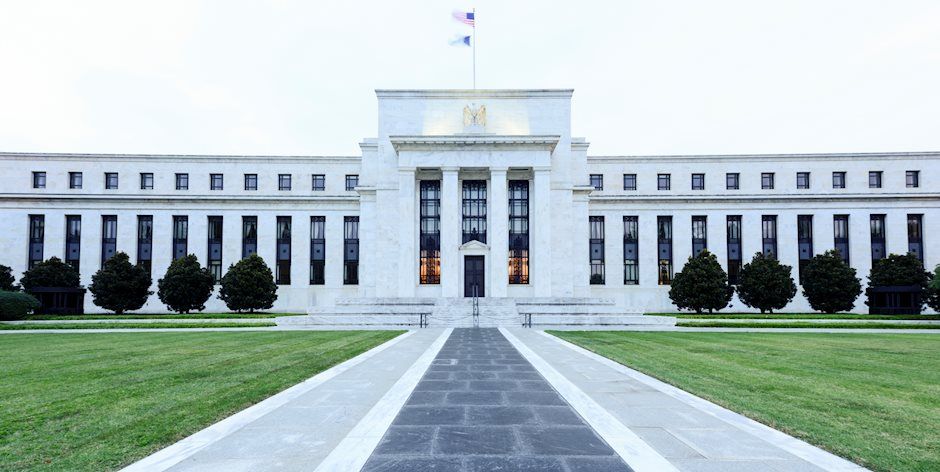Fed claims it can resume rate hikes while doubts grow

As the Federal Reserve begins to back off on tightening, the U.S. dollar is becoming increasingly vulnerable to selling.
The Fed left its benchmark interest rate unchanged at just above 5% at this week's policy meeting. It was the first time in over a year that central bankers decided not to hike.
In his remarks, Fed chairman Jerome Powell tried to maintain a hawkish tone despite the dovish policy move. He vowed to deliver more rate hikes later this year.
Jerome Powell: We have raised our policy interest rate by five percentage points and we've continued to reduce our securities holdings at a brisk pace. We've covered a lot of ground and the full effects of our tightening have yet to be felt. In light of how far we've come in tightening policy, the uncertain lags with which monetary policy affects the economy and potential headwinds from credit tightening, today we decided to leave our policy interest rate unchanged and to continue to reduce our securities holdings. Looking ahead, nearly all committee participants view it as likely that some further rate increases will be appropriate this year to bring inflation down to 2% over time.
Powell's telegraphing of additional hikes still ahead seems to be at odds with his own rationale for pausing this month. As he noted, the full effects of higher interest rates have yet to work their way through the economy -- particularly in sectors such as real estate which are sensitive to changes in borrowing costs.
If he wants to wait and see how the economy absorbs recent rate hikes before determining the next appropriate monetary response…then why declare in advance that more hikes are coming?
And if he's so confident that the economy can withstand higher rates, then why pause now… given that the Fed's battle to bring inflation down is still ongoing?
Central bankers would have us believe that they can predict the consequences of their actions months down the road. They would have us believe that they can fine tune the economy to achieve the right balance between bringing down inflation and avoiding recession.
But not everybody is a believer.
Currency traders evidently aren't buying the idea that the Fed will be able to resume rate hikes. After all, the same Fed that said inflation was transitory back in 2021. And the Fed also said contagion in subprime mortgages was contained before the collapse of 2008. The credibility of our central banking overlords is shot.
So traders went ahead and sold U.S. dollars on the foreign exchange markets this week. The Dollar Index dipped 1.8% for the week through Thursday's close. That puts it on track for its biggest weekly decline of the year.
Unfortunately for gold and silver bugs, the response in metals markets has been somewhat muted.
Metals markets were overshadowed once again by a surging stock market. The S&P 500 rallied to its highest level since April 2022. Amid the swelling bullish sentiment, momentum traders are piling into equities as an alternative to the dollar.
Stocks may have more upside potential than Federal Reserve notes, but they also carry downside risk. Higher interest rates mean investors may begin demanding higher dividend yields on stocks. And that may entail a repricing of share prices lower.
The earnings of large corporations are also at risk of taking a hit as the economy weakens. The Fed's only real strategy for getting inflation down is to reduce the capacity of consumers to spend. If that means crashing the housing market and putting millions of people out of work, then so be it.
The Fed admits that its recent policy actions will produce an uptick in unemployment in the months ahead. Jay Powell and company say publicly that they think the economy can avoid going into recession. But if they really had the ability to engineer a sustainable goldilocks scenario of low inflation and modest economic growth, then they wouldn't currently be in the position of fighting persistently high inflation.
They had said inflation would be transitory. Now they say the economy and the banking system and the dollar are all fundamentally sound.
In fact, the fundamentals for the U.S. currency are steadily deteriorating. The world is moving toward alternatives, including gold. And that move threatens the dollar's status as world reserve currency.
Treasury Secretary Janet Yellen admitted as much in comments before Congress this week. She noted that de-dollarization is taking place as foreign central banks and governments diversify their reserves and seek alternatives in international transactions.
Federal Reserve note’s share of global reserves declined by 8% last year. And that trend doesn't appear to be slowing down this year. In addition to Russia urging its trading partners to ditch the dollar, China is pressuring suppliers of oil and other vital exports to accept yuan for payments.
Even longstanding U.S. ally Saudi Arabia is reportedly considering pricing its oil in other currencies. That would effectively mean the end of the petro-dollar.
It's unlikely the Chinese yuan would assume the role of world's reserve currency. There are plenty of reasons why competing countries would mistrust it and the government that backs it.
But there are no trust issues with gold. It is universally recognized as the ultimate money. In a time of rising geopolitical tensions and a declining U.S. dollar, gold stands to become more important within the international monetary order -- and more valuable on the open market.
To receive free commentary and analysis on the gold and silver markets, click here to be added to the Money Metals news service.
Author

Mike Gleason
Money Metals Exchange
Mike Gleason is a Director with Money Metals Exchange, a national precious metals dealer with over 500,000 customers.

















